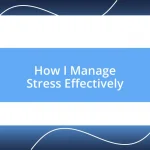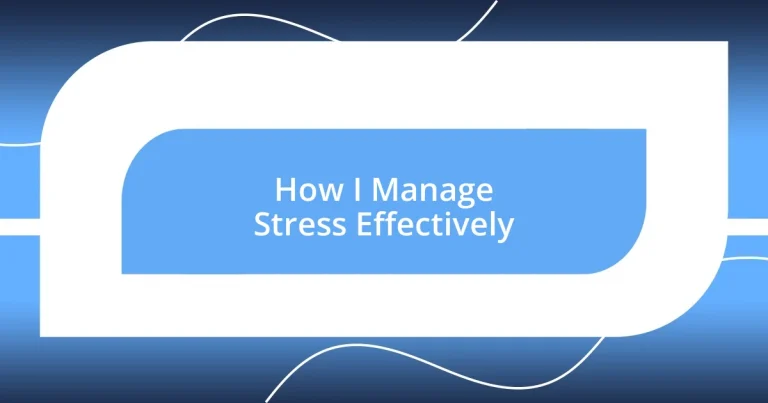Key takeaways:
- Recognizing stress triggers and symptoms is essential for effective stress management, allowing for more tailored coping strategies.
- Establishing healthy coping practices, such as journaling, mindful meditation, and regular exercise, can significantly improve emotional well-being.
- Building a support network and regularly evaluating stress management techniques help maintain effectiveness and enhance emotional resilience.
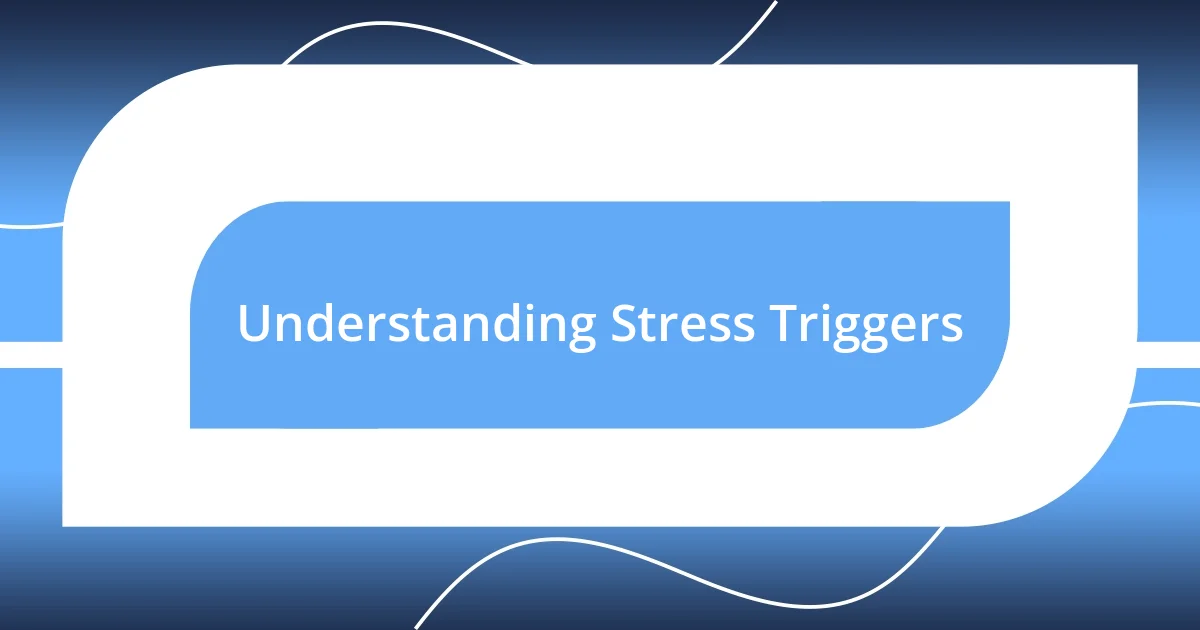
Understanding Stress Triggers
When I think about stress triggers, I recall that one particularly hectic week. I had deadlines looming, and experiencing constant interruptions made me realize how quickly my mind shifted to panic mode. Have you ever felt that sudden tightness in your chest when too many requests come your way? It’s in those moments that understanding our triggers becomes crucial.
Another significant trigger for me is feeling overwhelmed by uncertainty. For example, when I was waiting for a job offer, every tick of the clock felt like a countdown to a decision that loomed over me. I found myself spiraling into a cycle of worry. It makes me wonder: how often do we let the fear of the unknown dictate our emotional responses? Recognizing these patterns in my behavior has helped me develop more effective strategies to cope.
Sometimes, it’s the little things that catch us off guard. I remember a day when a simple argument with a friend turned into a day-long cloud over my mood. I realized that unresolved conflicts can serve as unexpected stressors. Do you notice how one small incident can trigger a much larger emotional response? Learning to identify these subtle triggers has been eye-opening for me, revealing the layers of stress I might not have acknowledged before.
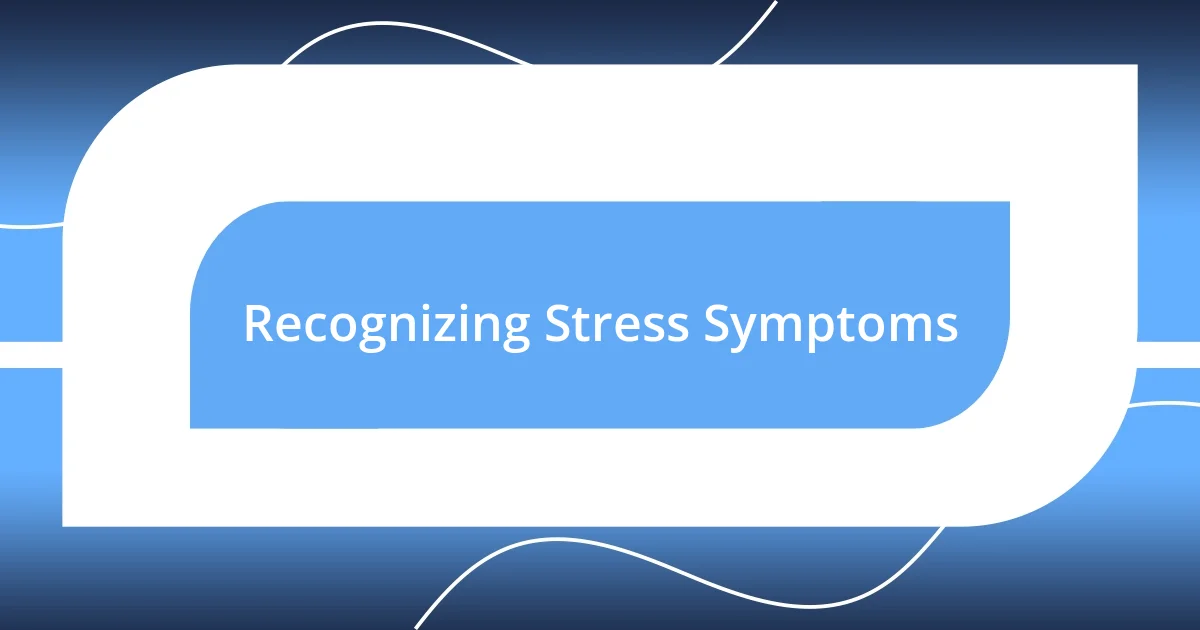
Recognizing Stress Symptoms
Recognizing stress symptoms is essential for effective management. I remember a time when I felt constantly fatigued, but I brushed it off as a normal part of life. It wasn’t until I noticed my irritability and lack of focus that I realized my body was signaling that something was amiss. These physical and emotional signs can tell us more than we might think; they are red flags, urging us to listen closely to our inner selves.
Here are some common symptoms of stress that I’ve identified through both experience and observation:
- Physical tension: Like the stiff shoulders I encountered after a long, stressful week.
- Headaches: A familiar companion that often felt like a constant throb after an overwhelming day.
- Sleep disturbances: I noticed my insomnia spiking during times of high stress, leaving me drained each morning.
- Irritability: Those small annoyances suddenly felt much larger, impacting my interactions with others.
- Cognitive issues: Struggling to concentrate on a task felt frustratingly familiar, adding to my stress.
Being aware of these symptoms has transformed my approach to stress management. The moment I recognize these signals, I find it easier to engage in practices that promote well-being.
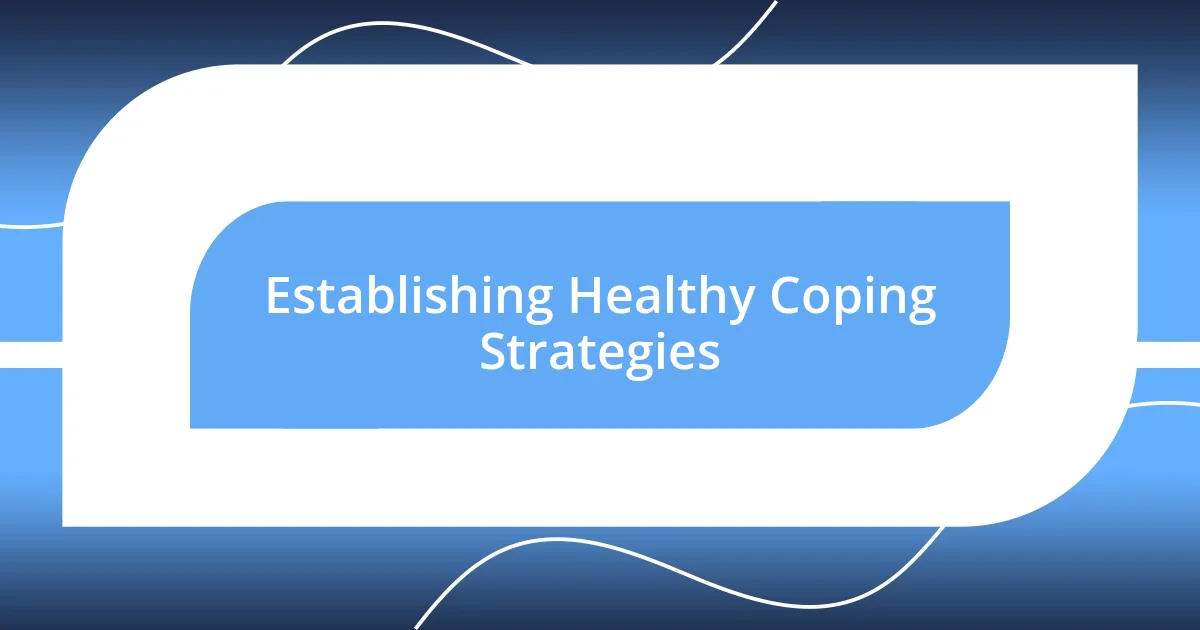
Establishing Healthy Coping Strategies
Establishing healthy coping strategies is crucial for navigating the tumultuous waters of stress. I recall a time when I turned to journaling to process my feelings. Each evening, I would take a quiet moment to write about my day, reflecting on what went well and what I found challenging. This practice not only brought clarity but also allowed me to release pent-up emotions, creating a sense of peace I didn’t know I was missing.
Mindful meditation has also become a pillar of my stress management toolkit. I remember the first time I sat in silence, focused solely on my breath; it felt both foreign and liberating. With each session, I noticed how just a few minutes of mindfulness could shift my energy and perspective. Isn’t it fascinating how just being present in the moment can help diffuse stress? For me, that stillness acts like a reset button in my hectic daily life.
Finally, I’ve found that maintaining a regular exercise routine significantly improves my overall well-being. Whether it’s a brisk walk in the park or a challenging yoga class, movement helps me release tension and elevate my mood. I can still picture the exhilaration I felt after a long run, where my worries seemed to evaporate with each step. How do you feel after you’ve moved your body? I’d encourage you to find what works for you, as establishing these strategies can transform your relationship with stress.
| Coping Strategy | Description |
|---|---|
| Journaling | Writing daily reflections to process thoughts and emotions. |
| Mindful Meditation | Focusing on breath and presence to cultivate calm. |
| Regular Exercise | Engaging in physical activity to relieve tension and boost mood. |
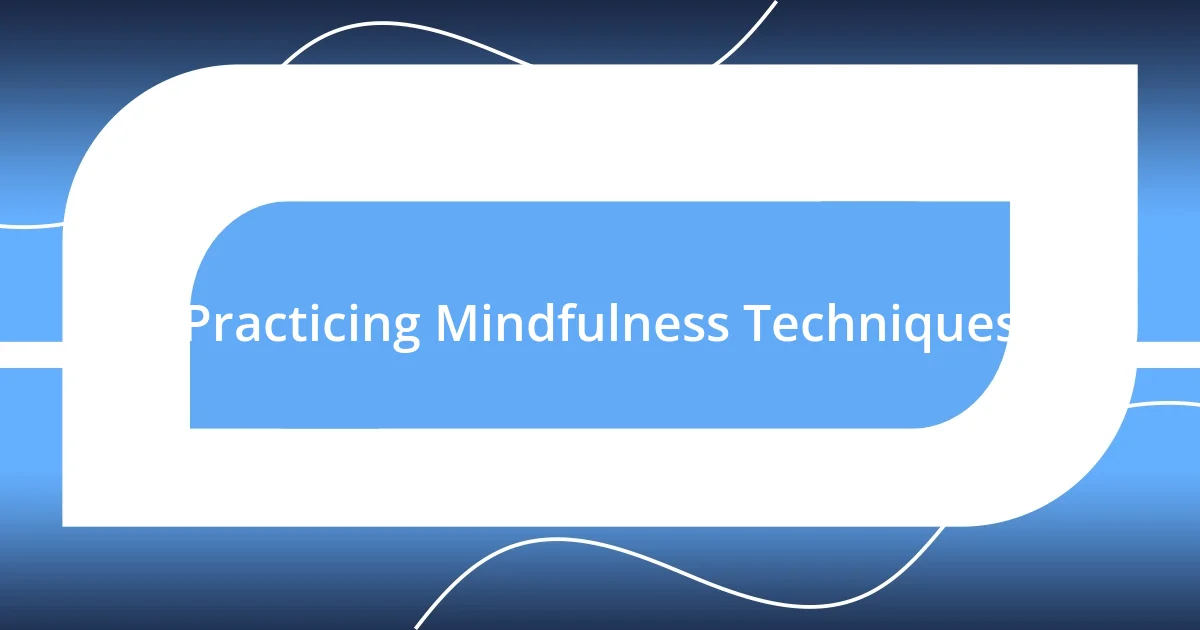
Practicing Mindfulness Techniques
Practicing mindfulness techniques has become an essential part of how I manage stress. One of my favorite methods is simple breath awareness. There was a particularly overwhelming week when I felt my anxiety rising. In those moments, I would pause, close my eyes, and take a deep breath. Just focusing on the sensation of the air filling my lungs brought me back to the present, reminding me that I could take control, even if just for a moment.
Additionally, I’ve found that mindful walking can be transformative. Picture this: stepping outside with the sun warming my face, each footfall connected to my breath. I remember one day when stress felt all-consuming, and a 10-minute walk turned everything around. As I tuned into the sounds of nature around me, it was like a weight lifted; the world felt manageable again. Don’t you find it striking how stepping away from our routine can shift our perspective so dramatically?
Then there are mindful eating practices, which I didn’t expect to find so impactful. I used to rush through meals, barely tasting what I was consuming. Now, I take the time to savor each bite, noticing flavors and textures. This shift not only enhances my eating experience but also gives me a moment of pause amid chaos. Have you ever tried slowing down during meals? I promise, the experience can be eye-opening as it encourages a deeper connection with ourselves.
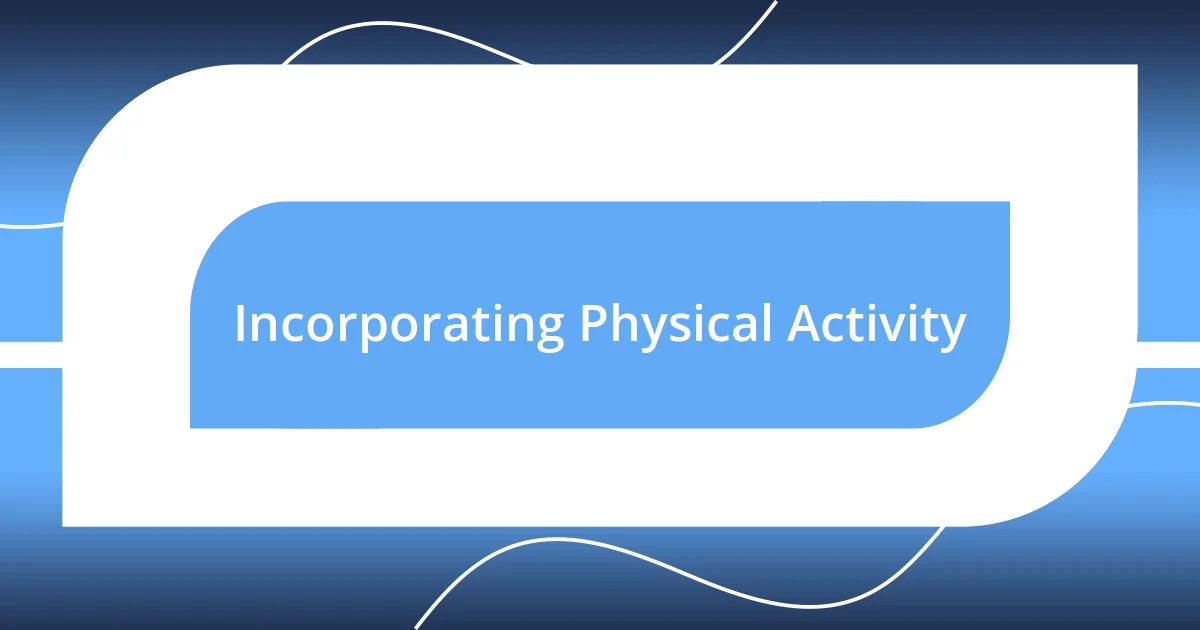
Incorporating Physical Activity
Incorporating physical activity into my daily routine has been a game changer for managing stress. I remember one particularly stressful day when deadlines loomed large. Instead of succumbing to the anxiety, I laced up my sneakers and went for a quick jog. Within just a few minutes of running, I felt the tension start to lift, leaving me with a clearer mind to tackle my tasks. Have you noticed how physical activity changes your mindset?
Yoga has also become a significant part of my stress management. There’s something magical about flowing through poses, feeling my body stretch and release tension. One evening, after a particularly exhausting day, I decided to roll out my mat and practice some gentle movements. As I moved, I could physically feel the stress leaving my body, and I emerged from the session feeling renewed, almost as if I had pressed a reset button. Isn’t it wonderful how movement can create such a profound shift in our emotions?
Even simple activities, like dancing in my living room, have proven effective. I recall a time when I needed a burst of energy, so I turned up my favorite playlist and let myself go. Just 15 minutes turned into a spontaneous dance party, and by the end, I was laughing at myself, completely forgetting the pressures I had faced earlier. How does it feel to let loose and engage with your body in such a joyful way? Embracing these moments of physical activity truly awakens a sense of liberation and joy in the midst of stress.
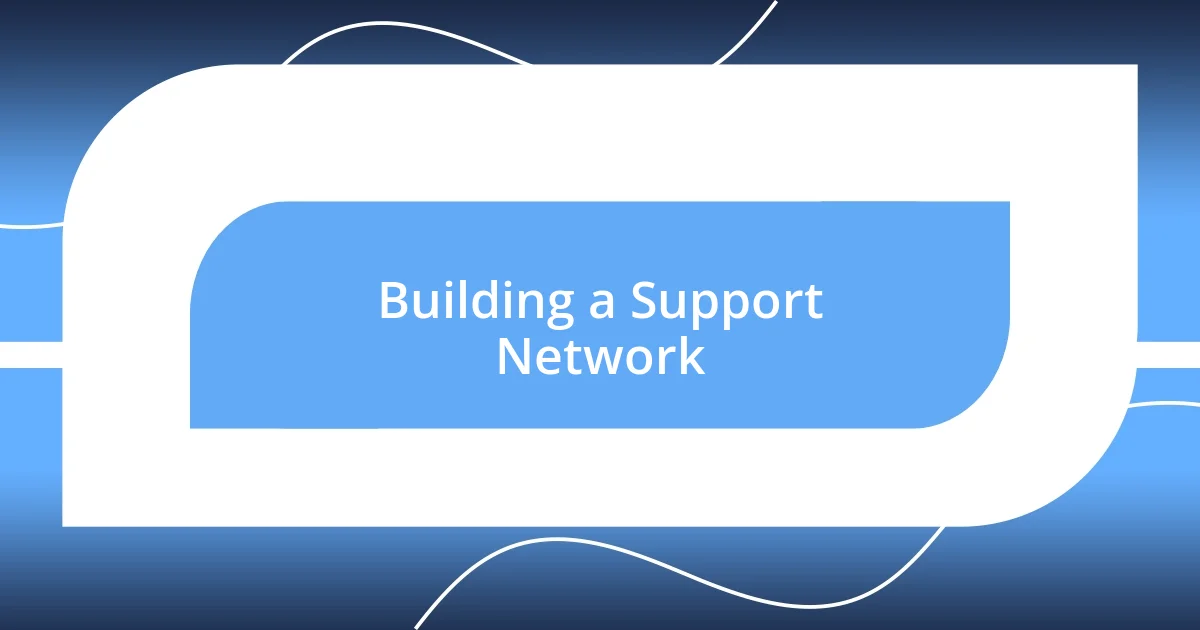
Building a Support Network
Building a support network has been pivotal in my journey of managing stress. I remember a particularly tough period when I felt isolated and overwhelmed. It was during those moments that I reached out to friends and family, and their willingness to listen transformed my mindset. Have you ever noticed how sharing your burdens can lighten the load? For me, opening up created connections that made me feel less alone in my struggles.
I’ve also learned the importance of surrounding myself with positive influences. My friends have this remarkable ability to uplift me during challenging times. There’s one friend in particular who never fails to send a message or call just when I need it most. I often think, how crucial is it to have those kinds of people in our lives? Knowing there’s someone cheering us on can turn a bad day into a manageable one, reminding us that we’re not in this alone.
Moreover, intentional networking—connecting with others who share similar experiences—has enriched my life. Joining support groups both online and offline has provided a space to exchange ideas and coping strategies. I vividly recall the first meeting I attended; I walked in feeling apprehensive but left with a sense of community and understanding. It’s incredible how these shared experiences create bonds that not only support our mental well-being but also empower us to face stressors head-on. Have you explored support networks in your own life? They might offer you the connection you didn’t realize you were missing.
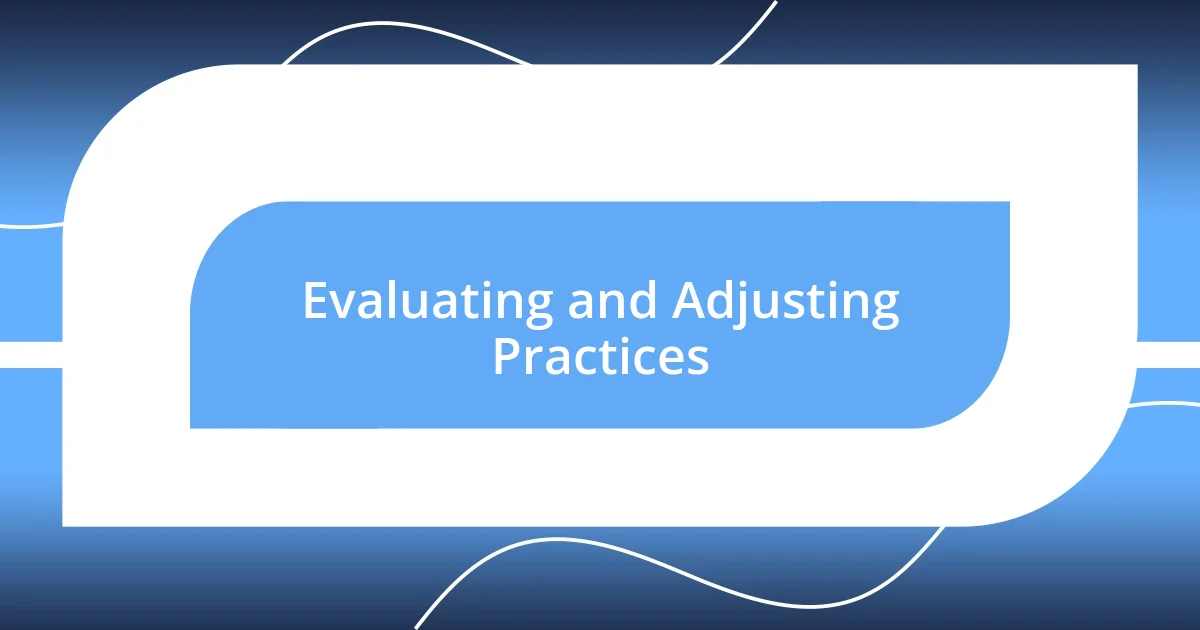
Evaluating and Adjusting Practices
Evaluating my stress management practices is essential to ensure they remain effective. I like to take a step back and reflect on what works and what doesn’t. Recently, I realized that while journaling had been a great release, my entries had become sporadic and less heartfelt. Have you ever felt like a practice has lost its spark? When I committed to writing again daily, the emotional clarity I gained was revitalizing, and I remembered why I started in the first place.
Adjusting my practices based on this evaluation is equally important. For instance, I used to force myself to stick to a strict meditation schedule, but there were days when it just didn’t feel right. Instead of feeling guilty, I embraced flexibility. Now, I shift between guided meditations or even a quiet moment with tea when I need a break. Isn’t it fascinating how small adjustments can lead to profound changes in our mental state?
Moreover, I often seek feedback from trusted friends about what they observe in my stress management journey. One day, a close friend pointed out that my reliance on screens for relaxation was counterproductive. That conversation opened my eyes. Have you stopped to ask for an outside perspective? By incorporating their insights, I shifted my relaxation time towards reading or crafts, which have brought me a surprising sense of fulfillment and creativity.









